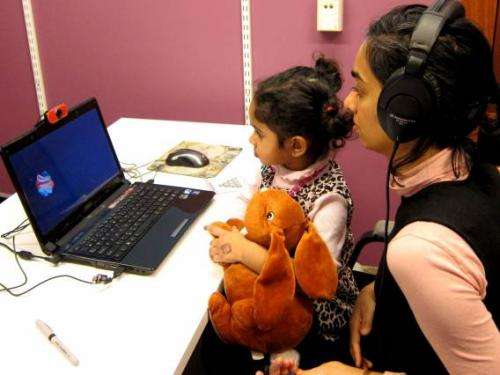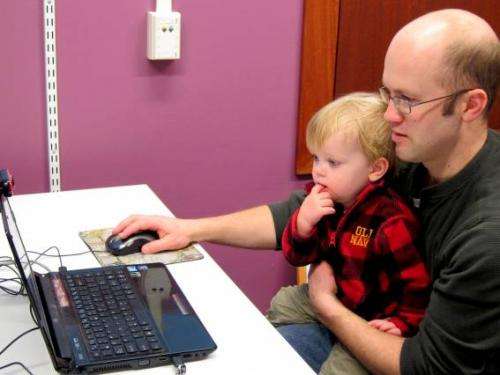Online lab to study early childhood learning

MIT's Early Childhood Cognition Laboratory (ECCL) has developed an online laboratory to study how infants and young children learn about the world. The website, called "Lookit," allows families all over the world to participate in scientific research about cognitive development. Parents can access the site through their web browser and complete 5- to 10-minute activities while their child's responses are recorded via webcam.
The activities and types of responses vary based on the participant's age. Preschoolers may answer spoken questions or point. To study preverbal infants, the lab often uses measures of looking behavior such as where or for how long a child chooses to look. From a webcam recording, the lab at MIT can reliably determine whether a child is looking to the left or right of the monitor or looking away entirely. Although online testing doesn't completely replace a traditional lab environment, researchers learn a lot from these simple measures. Six studies are currently available online for children four months through five years of age; each seeks to replicate a previously established finding or effect in order to validate the online system.
Beyond the practical value of being able to test many children quickly, which allows the lab to study small and graded effects that would be too time-consuming otherwise, researchers cite many benefits of moving some of the lab's work online. At-home research is more convenient for many families, especially those without a stay-at-home parent and those who don't live near a university lab. This accessability allows scientists to draw conclusions from a more representative sample of families. "Right now developmental labs usually only run studies with 16 to 24 children per condition, and they are almost always typically developing children from populations affiliated with universities. If we can run studies online, we can literally test the world," says MIT Department of Brain and Cognitive Sciences Associate Professor and ECCL Principal Investigator Laura Schulz.

In the future, online participation may alleviate the difficulty of running longitudinal studies, or studies that require follow-up tests later on. Instead of requiring parents to come back to the lab months or years later, the family can simply opt for an email reminder to complete the next phase of a study. Online labs may also allow families of children with specific developmental disorders to participate in research that directly addresses the nature of their children's condition. LookIt will provide a new outlet for education and outreach: a resource page will provide information about research in cognitive development in a format accessible to the layperson. "What we're really trying to do here is to harness the power of parents as citizen scientists," says Kim Scott, Lookit project leader and Schulz laboratory graduate student. "As parents we observe and wonder about our kids all day."

Interested families can register to participate on Lookit at https://lookit.mit.edu. A parent or guardian will need to provide a recorded statement of consent before participating. To view recordings of past experiments, visit the "examples" section of the Lookit website.

This story is republished courtesy of MIT News (web.mit.edu/newsoffice/), a popular site that covers news about MIT research, innovation and teaching.
















